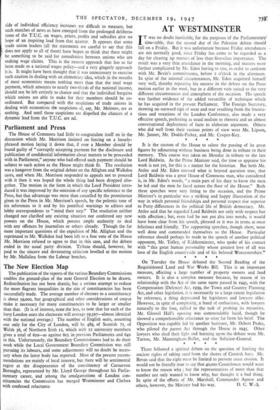Parliament and Press
The House of Commons had little to congratulate itself on in the discussion which Mr. Morrison insisted on forcing on a loosely- phrased motion laying it doWn that, if ever a Member should be found guilty of "corruptly accepting payment for the disclosure and publication of confidential information about matters to be proceeded with in Parliament," anyone who had offered such payment should be subject to such action as the House might think fit. The resolution was a hangover from the original debate on the Allighan and Walkden cases, and when Mr. Morrison responded to appeals not to proceed with it then it was hoped the whole thing had been dropped alto- gether. The motion in the form in which the Lord President intro- duced it was improved by the omission of any specific reference to the Press, but that advantage was more than cancelled by, the prominence given to the Press in Mr. Morrison's speech, by the polemic tone of his references to it and by his pontifical warnings to editors and lobby correspondents to " mind their step." The resolution neither changed nor clarified any existing situation nor conferred any new powers on the House, which possess ample authority to deal with any offences by journalists or others already. Though the far more important questions of the expulsion of Mr. Allighan and the reprimand to Mr. Walkden had been left to a free vote of the House Mr. Morrison refused to agree to that in this case, and the debate ended in the usual party division. Tribute should, however, be paid to the sincere and devastating criticism levelled at the motion by Mr. Yviallalieu from the Labour benches.


































 Previous page
Previous page